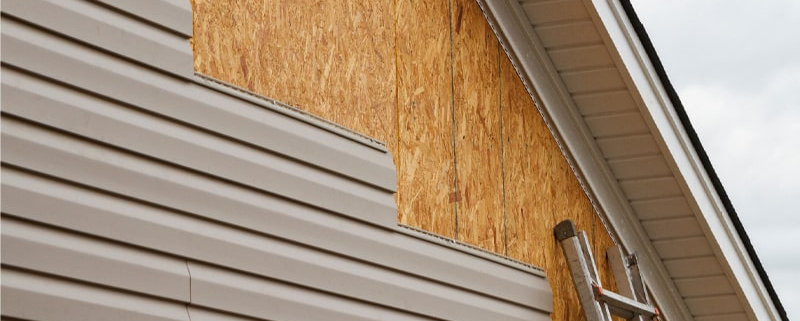Which Siding Material Should I Choose?
Choosing the right siding material isn’t just about appearances—it’s about long-term protection, maintenance, and value. With so many options available, it’s important to understand how different materials perform in the Mid-Atlantic climate. Whether you’re replacing aging siding or planning a full exterior renovation, this guide will help you choose the best siding material for your home.
Key Takeaways
- Fiber cement, engineered wood, and vinyl are popular siding materials for Maryland, Virginia, and surrounding areas.
- The best siding for your home balances durability, curb appeal, and resistance to moisture, pests, and seasonal wear.
- Professional installation and quality materials—like James Hardie and LP SmartSide—maximize long-term value.
Why Siding Choice Matters
Your home’s siding is the first line of defense against the elements. It protects your structure from wind, moisture, and UV exposure, while also contributing to insulation and energy efficiency. In regions like Central Maryland and Northern Virginia, where humid summers and fluctuating temperatures are common, siding must be able to withstand moisture intrusion, expansion, and contraction.
Old or damaged siding can lead to water damage, mold growth, and higher energy bills. That’s why selecting the right material—and having it installed by a trusted local contractor—is critical.
Fiber Cement Siding: Strong, Stylish, and Low-Maintenance
Best for: Homeowners seeking durability, fire resistance, and a wood-look finish without the upkeep.
Fiber cement is a top-tier siding material made from a mixture of sand, cement, and cellulose fibers. James Hardie fiber cement siding is particularly popular for its long lifespan, color retention, and resistance to moisture and pests.
Advantages:
- Extremely resistant to rot, insects, and fire
- Holds paint color well with factory-baked finishes
- Mimics the look of real wood without the maintenance
- Ideal for humid, storm-prone regions
Considerations:
- Heavier than other materials; requires professional installation
- Higher upfront cost but long-term savings on maintenance
Engineered Wood Siding: Natural Look with Modern Strength
Best for: Homeowners who want the warmth of real wood with added protection and flexibility.
Engineered wood, like LP SmartSide, combines wood strands and resins to create a material that’s strong, lightweight, and resistant to the elements. It’s treated to withstand termites, fungal decay, and extreme weather conditions.
Advantages:
- More impact-resistant than fiber cement
- Easier and quicker to install
- Can be painted or stained for customized finishes
- Offers an authentic wood grain texture
Considerations:
- Requires occasional repainting or sealing over time
- Slightly more vulnerable to moisture than fiber cement
Vinyl Siding: Affordable and Versatile
Best for: Budget-conscious homeowners seeking a low-maintenance solution.
Vinyl siding remains a popular choice due to its affordability and wide color selection. While it doesn’t match the longevity or performance of fiber cement or engineered wood, it can still be a smart choice for well-maintained properties in moderate climates.
Advantages:
- Cost-effective with minimal maintenance
- Available in many colors and profiles
- Won’t rot or require painting
Considerations:
- More prone to cracking or warping over time
- Less resistant to extreme weather
- Limited lifespan compared to premium materials
Comparing Siding Materials at a Glance
| Feature | Fiber Cement | Engineered Wood | Vinyl Siding |
|---|---|---|---|
| Durability | Excellent | Very Good | Moderate |
| Maintenance | Low | Moderate | Low |
| Aesthetic Versatility | High | High | Medium |
| Installation | Requires expertise | Easier to install | Easy to install |
| Cost | $$$ | $$ | $ |
| Best Use Case | Long-term performance | Wood-look efficiency | Budget-friendly fix |
Choosing the Right Look for Your Home
While performance is critical, curb appeal matters too. Your siding should complement your roof, trim, and windows for a unified exterior design. Modern fiber cement and engineered wood options come in a wide variety of colors, textures, and lap sizes to suit everything from Cape Cod to Colonial to Craftsman-style homes.
Consider mixing vertical and horizontal panels, or adding shake accents to gables for visual interest. Color trends in the Mid-Atlantic region lean toward warm grays, deep blues, and natural earth tones—especially when paired with crisp white trim and dark roofing.
Why Professional Installation Matters
The longevity and performance of your siding heavily depend on the quality of installation. Improper flashing, inadequate sealing, or uneven panels can lead to moisture intrusion and premature failure. Certified contractors like Arocon Roofing and Construction ensure your siding is installed with precision and backed by full manufacturer warranties.
Since 2008, our team has helped homeowners across Maryland, Virginia, and Southern Pennsylvania protect their homes with expert craftsmanship and industry-leading products.
Frequently Asked Questions
What’s the most durable siding material?
Fiber cement siding is generally considered the most durable, especially in climates with high humidity, storms, and temperature fluctuations.
Is engineered wood better than vinyl?
Yes. Engineered wood offers better impact resistance and aesthetics than vinyl, though it does require more maintenance.
Can I install siding myself?
DIY siding installation is not recommended. Professional installation ensures proper sealing, alignment, and warranty protection.
How long does new siding last?
Fiber cement and engineered wood siding can last 30–50 years or more with proper installation and maintenance. Vinyl typically lasts 20–30 years.
Do I need to remove old siding before installing new?
It depends on the condition of the existing siding. A professional inspection can determine whether removal or an overlay is the better choice.
Ready to Upgrade Your Siding?
Whether you’re leaning toward the strength of fiber cement, the versatility of engineered wood, or an affordable vinyl solution, Arocon can help you make the right choice.



